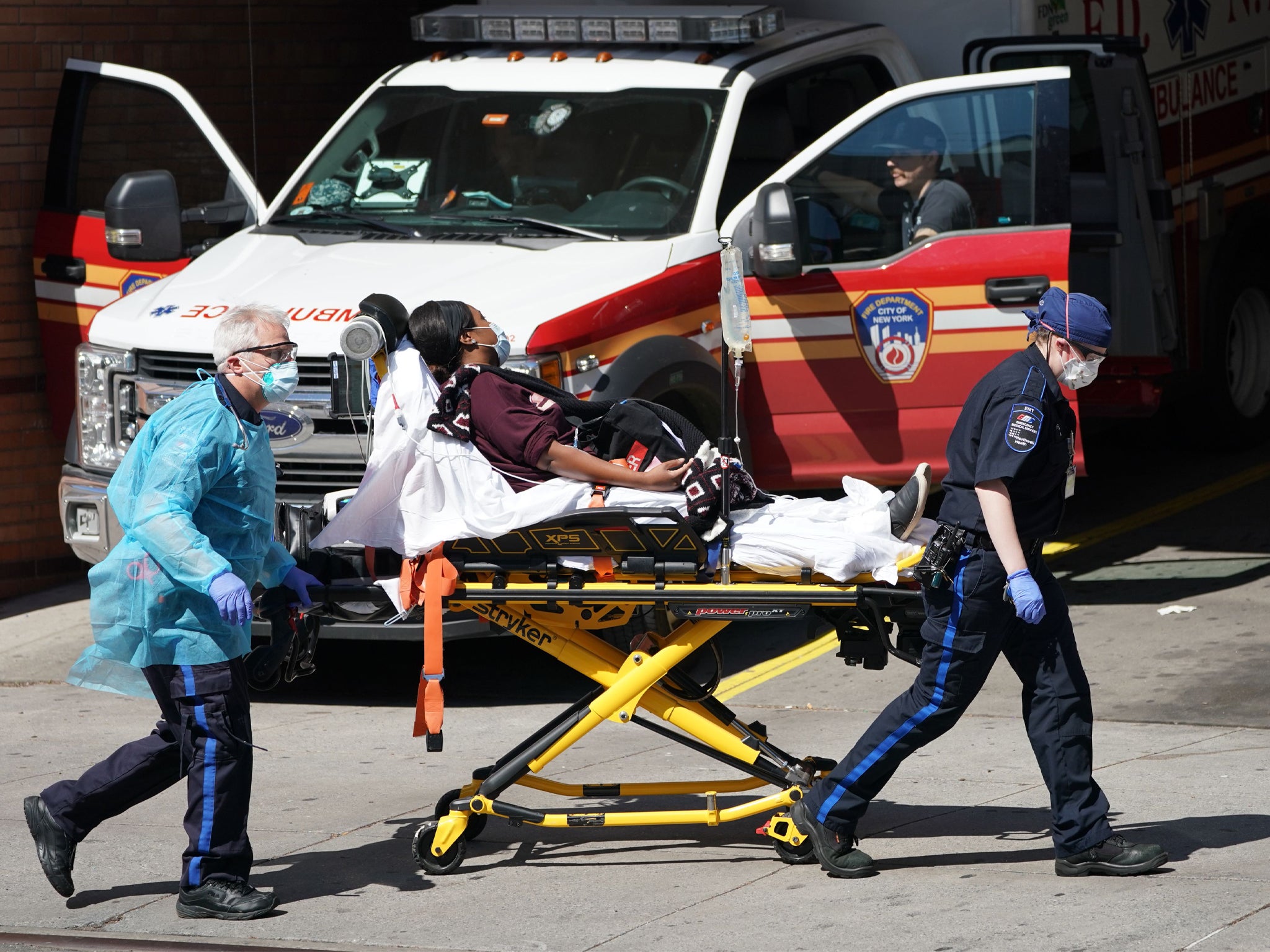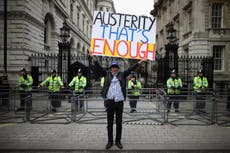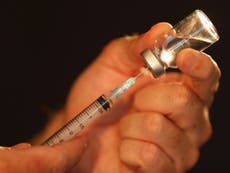How the world reacted to the pandemic
As the global Covid-19 death toll reaches the grim milestone of 1 million, Sean O’Grady considers the successes and countless failings of the international efforts to combat the virus


Your support helps us to tell the story
From reproductive rights to climate change to Big Tech, The Independent is on the ground when the story is developing. Whether it's investigating the financials of Elon Musk's pro-Trump PAC or producing our latest documentary, 'The A Word', which shines a light on the American women fighting for reproductive rights, we know how important it is to parse out the facts from the messaging.
At such a critical moment in US history, we need reporters on the ground. Your donation allows us to keep sending journalists to speak to both sides of the story.
The Independent is trusted by Americans across the entire political spectrum. And unlike many other quality news outlets, we choose not to lock Americans out of our reporting and analysis with paywalls. We believe quality journalism should be available to everyone, paid for by those who can afford it.
Your support makes all the difference.How did the world react to the coronavirus pandemic?
The short answer is that it didn’t – at least in the sense of some unified, coordinated global response to a global pandemic. In fact, at the international level, it still hasn’t, and probably never will.
A good working assumption at the outset of the crisis, when the full horrors were just becoming clear, was that the medics, the scientists and perhaps businesses would be professional and overactive; and that the politicians would over-promise and under-deliver.
A clear strategy, albeit flexible, strong international cooperation and honest political leadership was needed in every nation. That is what logic, public health and sheer enormity of the challenge demanded, and it was found wanting and it has been one of the most striking features of the crisis that nationalism and politics have trumped medicine at almost every opportunity.
There were export bans on medicines and equipment; America withdrew from the World Health Organisation (WHO), effectively defunding it; and every country put its own interests first.
So much for the politicians. By contrast, the few tentative successes – partial control of the virus, developing new treatments to reduce mortality and progress to a vaccine – have been achieved by scientists and, yes, big pharma, working transnationally.
Although the emergence of what we have come to know as Covid-19 was probably not quite a year ago, we have perspective enough now to reflect on what went wrong.
First, China. It is probably true that the first cases were detected in the city of Wuhan, in eastern China, and that that is where the coronavirus originated.
It may have “jumped” zoonotically, in a live animal market, from bats and via pangolins to human beings. Others say the virus “escaped” from a laboratory, possibly – venturing further into conspiracy theory territory here – as part of some Chinese plan for world economic domination (as if they need such a diabolical, indiscriminate and illogical scheme as Covid).
Such ideas have not been satisfactorily refuted, and the facts established partly because of Beijing’s consistent refusal to allow an independent international inquiry into the origins of coronavirus.
Even now though, in a telling example of the many obstacles to the discovery of the truth, the Chinese authorities do not necessarily accept that it originated in China; they suggest the virus was, maybe, somehow imported into China.
As late as 28 April, in a BBC interview, the Chinese ambassador to London was dropping some ominous hints about the origins of Covid: “It was first discovered in Wuhan, but I can’t say it originated from Wuhan. According to many reports, including BBC, it can be anywhere. It can be found on aircraft carriers. It can even be found in the submarine ... so we cannot say it originated in China.”
China’s influence in the WHO, it’s been suggested, prevented early global warnings of the crisis. The WHO director-general Tedros Adhanom Ghebreyesus, an Ethiopian who owed his position to Chinese support, was accused of being overly sensitive to Beijing’s sensitivities.
The early WHO statements on Covid were not, at least with the benefit of hindsight, overly cautious: the risk of human-to-human transmission was identified on 20 January; a formal pandemic was only announced on 11 March.
On the other hand, the WHO was very clear about the importance of testing and tracing, famously declaring on 16 March: “Once again, our message is test, test, test.”
That much they got right, but it was not enough to save the WHO from an American boycott, still less establish the WHO as a global “clearing house” for research and coordinated policy action.
Rightly or wrongly, president Trump rounded on the WHO for failing to earn the world about what he called “the China Virus”, a term that has not caught on much even among his fan base.
While Trump’s misgivings about the WHO and China might have some basis in reality, as a national leader and the “leader of the free world”, the president must take his share of the blame for the death toll.
America’s Covid mortality rate is one of the worst in the world, astonishingly so for such an advanced civilisation. By that same token – sophisticated technology and techniques – it is also true that if you happen to live in the United States and catch the virus, your chances of surviving it are better than almost anywhere.
This statistical confusion arose when the president started waving charts around during a memorable interview in August with Jonathan Swan of Axios. To be fair, Trump had a valid point, but still the lack of the effective control claimed by Trump has meant Americans have disproportionately suffered and died from it – more than 200,000 deaths.
According to Bob Woodward’s conversations with the president, he deliberately played the crisis down in its early stages (which rather undermines his criticisms of the WHO’s complacency). But he went further than that publicly, effectively calling it a “hoax” (a favourite attack word) at a rally in South Carolina on 28 February, remarking on the Democrats “this is their new hoax”.
If Covid does ensure the removal of president Trump from office it will be one of many of its unpredictable consequences. Yet Trump has only himself to blame for his more eccentric interventions.
The low point was probably the enthusiasm for using bleach to treat Covid and destroy the virus, when he wondered aloud at a press conference in April whether there might be some way of getting bleach or sunlight inside the human body.
Trump stated: “And then I see the disinfectant where it knocks out in a minute. One minute. And is there a way we can do something like that, by injection inside or almost a cleaning?”.
The White House subsequently claimed the president was being “sarcastic”. Trump’s running arguments with his medical adviser Anthony Fauci, blame throwing at state governors and city mayors, reluctance to wear a mask, and political rallies held in defiance of social distancing precautions have also damaged Americans’ confidence in his ability to win the war against Covid.
His attempts to blame China for the “plague” seem to have energised his base, but not gained wider acceptance. The buck still stops in the Oval Office.
In a parallel universe, perhaps it is possible to imagine the leaders of China and America heading a global summit on the crisis pointing the way to a way out. Or perhaps it is just unrealistic.
After all, there are plenty of other Covid deniers out there. Probably the most carefree has been the president of Brazil, Jair Bolsonaro, whose country, with its deep economic and health inequalities, has also suffered grievously from the pandemic, with the world’s second highest death toll.
With some irony, the president was himself tested positive for Covid in July, and chuckled about the “mould” in his lungs during a broadcast to the nation. He has consistently resisted lockdowns because of their (indisputable) immediate severe economic impact.
Recent polling has suggested that the Brazilian public agree more than one might assume about that. As lockdowns elsewhere in the works take hold, no doubt more people may come to the view that the balance between economics and health is wrong. As economic stimulus measures such as furlough schemes wind down, covid fatigue and loss of jobs may overtake health as the main priority for voters.
Such shifts in public opinion will do nothing to repair any sense of international community. The European Union, for example, is an organisation with money, high ideals and all the structures in place to deliver solidarity and practical solutions.
Yet from the early days of the crusts when northern Italy was overwhelmed by the first wave of cases the EU did virtually nothing. EU Commission president Ursula van der Leyen even publicly apologised to Italy over the failure to provide assistance.
The arrival of a second wave means there are no longer any easy answers, or alibis to the public’s frustrations
She and her fellow commissioners had to watch helplessly while national governments went their own way; the Czechs took to mandatory face masks; Germans successfully tested their way to safety; the Swedes decided to control themselves; and France blocked exports of ventilators. The Russians, meanwhile, pretended that they developed the first covid vaccine.
Did anyone “get it right”? No, and, to be fair, the public at the beginning of the crisis tended to give their governments the benefit of the doubt. Indeed in most countries incumbents tended to rise in the polls.
The pandemic was “unprecedented”, “something no one could prepare for” and “a worldwide phenomenon”. At first, media critics and opposition politicians were discounted. That didn’t last, of course, and the arrival of the second wave means there are no longer any easy answers, or alibis to the public’s frustrations.
In Britain the fall from grace and sympathy of Boris Johnson has been dramatic. A consistent habit of promising “moon shots” and “world beating” technologies, always imminent, and failing to deliver has shredded his popularity. Other countries just seemed to do things better; not perfectly, but just quicker and more efficient.
The far eastern states, such as South Korea, Japan and Taiwan had more experience with new virus epidemics, such as “bird flu”, and are habitual mask wearers, which explains some of their relative success. The Chinese and other authoritarian regimes have the option of draconian curfews and lockdowns, backed by surveillance and a police state (though it's risky looking official stats are viewed with scepticism).
Sub-Saharan Africa has benefited in part from its youthful demographics. India has had a huge number of cases, in line with its huge populous, but its relatively low mortality rate, for an emerging economy, seems to be down to an early well-observed lockdown. Unlike in so many other measures of human well-being, coronavirus is not so as closely correlated to prosperity as might at first be assumed.
The story of the political response to coronavirus has been and continues to be mostly dispiriting. That, and the economic pessimism around adjusting to the “new normal” of mass unemployment and broken cities tends to overshadow a much brighter outlook.
For there are about 40 vaccine programmes in development, with cautious optimism coming from some of them. This is extremely encouraging, and of course the researchers and pharmaceutical companies are already delivering therapeutic drugs for covid that have significantly improved outcomes.
Perhaps they will extend the work to come up with some answers to what we now know are lasting disabilities – “long covid”. There will be the usual scramble by riches nations to buy up supplies, but eventually through 2021 the world should gain a degree of “herd immunity” without doing so the hard way and letting the virus rip through populations.
Humanity has also seen bravery from its doctors and nurses, but also from underestimated, unexpected quarters – bus drivers, supermarket staff, care home cleaners. Heroes have emerged from this process, usually in labs and white coats, or trying their best in hospital wards with inadequate personal protection. They and their families have taken a heavy share of the suffering.
Among the million dead, one story stands out in the context of understanding how the virus took hold, and thus because of the lesson it offers: Chinese doctor and whistleblower Li Wenliang.
It was he who first tried to raise the alarm last December when he noticed the similarities with Sars. But he was warned off by the police for “spreading rumours”, and his claims were rubbished.
In February he succumbed to Covid, which he contracted while caring for patients in Wuhan. It would be reassuring to think that what happened to Dr Li Wenliang could not happen again, when the next pandemic erupts, which could be anywhere in the world.
Yet that would require the political classes – an unheroic bunch at the best of times – to acknowledge their mistakes. It’s a pity for the rest of us that they’re such deliberately slow learners.







Join our commenting forum
Join thought-provoking conversations, follow other Independent readers and see their replies
Comments